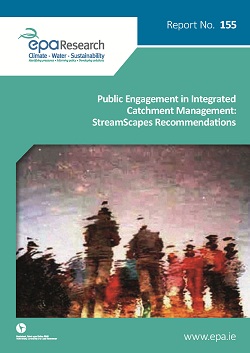EPA Research 155: Public Engagement in Integrated Catchment Management
Mark Boyden, StreamScapes Aquatic & Biodiversity Education Project
Summary: This study provides an overview of practical examples of public engagement and makes recommendations in an effort to contribute to the quest to determine viable, practicable and effective engagement techniques to secure meaningful participation by the public in the attainment of essential aquatic and biodiversity goals.

Identifying Pressures:
Water is an essential commodity: human life – and indeed all life on earth – depends upon it. The question is “how will we deal with it such that it sustains us now and in the future?” Effective water management is critical to the future well-being of Irish society. We need an adequate supply of good quality, safe water - for drinking, to protect biodiversity under the Habitats and Birds Directives, to obtain ‘good quality’ status for all waterbodies as specified by the Water Framework Directive (WFD), and for industrial and agricultural use, especially in the context of Food Harvest 2020 (FH2020) goals.
Informing Policy:
The Integrated Catchment Management (ICM) approach has been proposed (Harris, 2013; Daly, 2013) as being required to achieve effective water and catchment management, and implement the WFD. A key focus in ICM is developing a vision for the catchment, by involving local stakeholders. Article 14 of the WFD also specifies that consultation and involvement of the public be included as part of implementation, but EU WFD guidance states ‘no blue-print exists for public participation, and… the public participation process should be organised and adapted to national, regional and local circumstances.’ This study provides a practical guide to what works when engaging local communities around Ireland.
Developing Solutions:
Broadening the scope of possible management strategies by including different interests and stakeholder groups helps policy makers to develop flexible ways of managing the environment. This small scale study draws on StreamScapes’ 25 years of experience of delivering environmental education programmes around Ireland, focused on the aquatic environment and biodiversity. StreamScapes have helped local populations understand these issues at catchment scale. This report details the techniques they have developed for public engagement, and recommendations for the future.
https://www.epa.ie/media/epa-2020/publications/research/EPA-research-155-Front-Cover[1].jpg